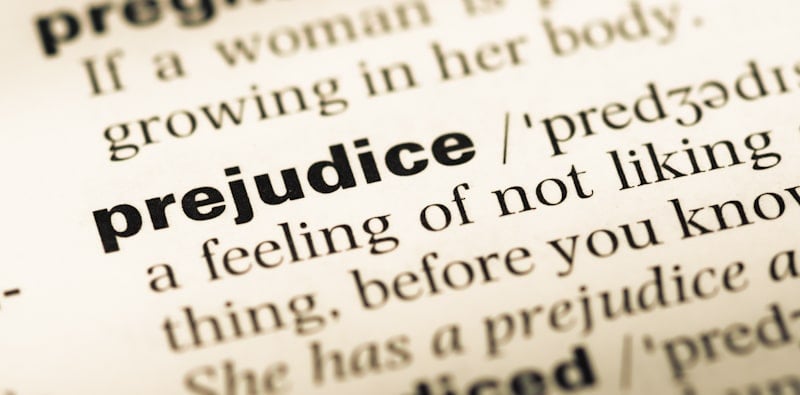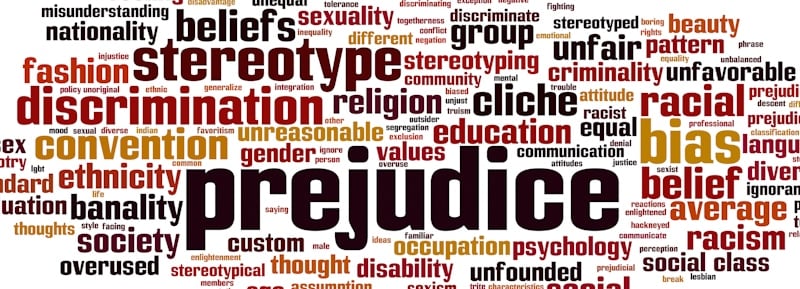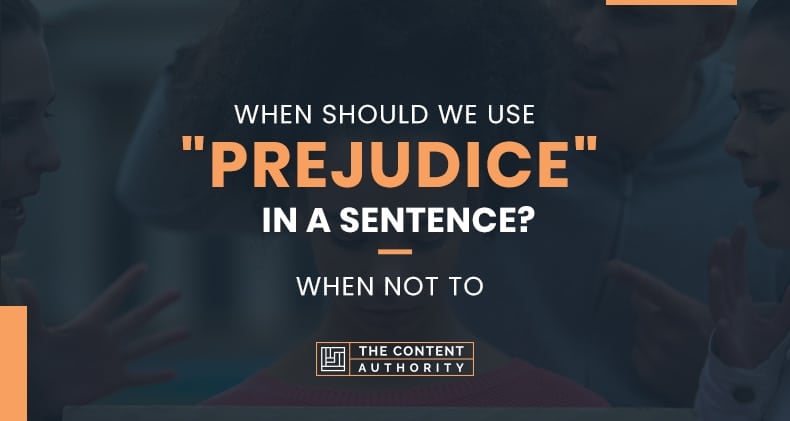The word “prejudice” is one that most of us have come across in the popular book of Shakespeare titled “Pride and Prejudice.” However, we still need to fully understand everything about this word and how to use it correctly. So, the question of when should we use “prejudice” in a sentence and when not to will be answered in this article.
The word “prejudice” refers to an opinion or judgment given without any sufficient basis, knowledge, reason, or experience. An example of using the word “prejudice” is: He had great prejudice against people from different cultures and backgrounds from his family.
It seems exciting to use the word “prejudice” in a sentence now that the meaning has been provided. However, it would be best if you understood the basics of the word before using it. Everything you need to know about the word “prejudice” will be explained in this article.

What Does The Word “Prejudice” Mean?
At times, we make a grammatical error that affects our communication because we lack the proper knowledge on how to use some words correctly. However, to avoid making these errors, you have to learn about a word before using it when writing.
We may misuse the word “prejudice” when writing. However, to avoid making these errors, we will be explaining the meaning, nature, and origin of the word “prejudice.”
We will start by giving different meanings to the word “prejudice.”
The word “prejudice” refers to being biased in your judgment or opinion about someone or something. An example is: The explanation provided by the head boy might prejudice the headmaster. In this case, the word “prejudice” means influencing or swaying someone’s decision or judgment.
It also refers to the harm, damage, or injury that can be caused by someone’s judgment, action, or decision. Another definition of the word “prejudice” is a feeling of dislike for a particular group of people or things.
The word “prejudice” also means having a preference for a particular group of people or thing over the other. It also refers to an act of influencing someone, either by your words or actions, to act unfairly to someone else.
You can also describe the word “prejudice” as doing something to make another person’s situation worse than it is supposed to be. An example is Victoria claimed that Victor prejudiced her health condition by refusing to pay for her surgery.
It also means having an irrational attitude or behavior of hostility targeted at an individual, a group of people, a race, or their supposed characteristics. In other words, it means to discriminate against people.
The word “prejudice” is a preconceived idea or preconception based on inadequate knowledge of something or about someone. “Prejudice” is often based on stereotypes.
In the legal world, “prejudice” often means the final dismissal of a court case. So when a judge dismisses a case “with prejudice,” it means the court wants that case to be dismissed in every other court and should not be on trial again.
The nature of the word “prejudice” refers to the function it performs in a sentence. It is also the part of speech it is categorized under.
Now, what is the nature of the word “prejudice”?
The word “prejudice” is a dual functional word. This means it performs more than one function in a sentence. The word “prejudice” performs the function of a noun and a verb in a sentence. This means it is a naming word and also an action word.
An example of the word “prejudice” as a noun is she has a prejudice against local dishes. An example of “prejudice” functioning as a verb is everything I heard about the new manager prejudiced me against him even before we met.
Next, we will talk about the origin of the word “prejudice.”
The word “prejudice” is a borrowed word from the Old French, which is from the Latin word “prejudicium” (which means injustice), from the Latin word “praeiudicium” (which means prior judgment, damage, or harm), from the word “prae-” (meaning before) and “iudicium” (meaning judgment), from the word “iudex” (which means a judge.)

Synonyms and Antonyms of the Word “Prejudice”
Now, we will be discussing the synonyms and antonyms of the word “prejudice.” When we talk about the synonyms of “prejudice,” we refer to the words that are similar in meaning to the word “prejudice.”
The synonyms of the word “prejudice” are:
- Preconception
- Partiality
- Discrimination
- Unfairness
- Detriment
- Influence
- Bias
- Damage
- Criticism
- Damage
- Favoritism
- Resentment
- Misinterpretation
- Purpose
- Manipulate
We will be looking at some examples that show how we use the synonyms of the word “prejudice” correctly in a sentence.
Examples with “prejudice”
- Most of my classmates were scared that our class captain’s conversation with the teacher will prejudice his decision to punish them.
- Julia’s prejudice against black people created a huge dislike towards Mary and her family.
- Her prejudice about the disagreement between her parents caused some confusion in the family.
Examples with the synonyms of “prejudice”
- Most of my classmates were scared that our class captain’s conversation with the teacher will manipulate his decision to punish them.
- Julia’s resentment against black people created a huge dislike towards Mary and her family.
- Her misinterpretation of the disagreement between her parents caused some confusion in the family.
Moving on, we will look at some of the antonyms of the word “prejudice,” i.e., words that are opposite in meaning to “prejudice.” The antonyms of the word “prejudice” includes;
- Neutral
- Fairness
- Impartial
- Equality
- Justness
- Tolerant
- Open-minded
- Attraction
- Admire
- Friendship
- Certainty
- Fact
- Reality
- Blessing
- Kindness
Examples with the antonyms of “prejudice”
- Drake the white boy showed kindness to the old lady by helping her cross the road even though she is a black woman.
- The judge was impartial in his judgment, so he let the innocent go free, and the guilty were sentenced to some years in prison.
- One of the reasons he got a high score in his essay was because he stated all the facts required.
- I admire Jane a lot because she is hard-working, humble, obedient, respectful, and courageous.
- When his two best friends started arguing about which basketball team is better and asked for his opinion, he said he was neutral and not supporting any.
How To Properly Use “Prejudice” In A Sentence
You use the word “prejudice” to describe someone who takes action or judges, someone without properly understanding the situation. It is also used to describe hostility to someone without having a valid reason.
Another way to use the word “prejudice” is to describe someone as unfair or biased in his decisions and judgment, especially through someone else’s influence. It is when there is partiality or favoritism in treating others.
The word “prejudice” is used when someone is caused harm or injury due to another’s action, decisions, or judgment. It also refers to a complete dismissal of something, especially a case in the court.
It is also used to describe the discrimination of a particular race, gender, or color of other people. There are different types of prejudice, such as racism, sexism, homophobia, religious prejudice, and social prejudice.

Illustrative Examples on how to use the word “Prejudice”
Below are some examples that will clarify the correct use of the word “prejudice” in a sentence.
- Ever since the new inspector general of the police force has been in power, none of the police officers has to prejudice a case for fear of being sacked.
- I talked to one of my friends, and I told him that it would be stupidity to prejudice a person simply because of their nationality or race.
- During our research, we found out that during the olden days, lots of people prejudice women.
- During the visitor’s speech to the students, he stated strongly that one of the greatest obstacles to progress today is prejudice.
- One of the new law implementations in my country is that racial prejudice will no longer be allowed and is strictly prohibited.
- Because June was born in the ’90s, she had a prejudice against modern music until she listened to one and began to love modern music.
- Their decision to return the child to foster care was based on a lack of knowledge and prejudice.
- In the world we live in today, there is prejudice everywhere, against the poor, against the less educated, against the opposite gender, and others.
- Our prejudice has always hindered success, and unless we work and strive to overcome them, we will never move forward.
- The prejudice against former convicts has made it difficult for them to live normally and be reacquainted with old friends.
- Because Dicky’s mother was white and his father was black, he had to put up with the prejudice from children throughout his whole educational journey.
Final Thoughts
Using the word “prejudice” is not at all difficult once you have an understanding of how to use the word. This article covers everything you need to know to use the word correctly when writing.
There is no doubt that you need to follow principles that will make you understand when to use the word “prejudice” in a sentence and when you should not. Learning new words is fun, but using them correctly when communicating is much fun.
Shawn Manaher is the founder and CEO of The Content Authority. He’s one part content manager, one part writing ninja organizer, and two parts leader of top content creators. You don’t even want to know what he calls pancakes.

